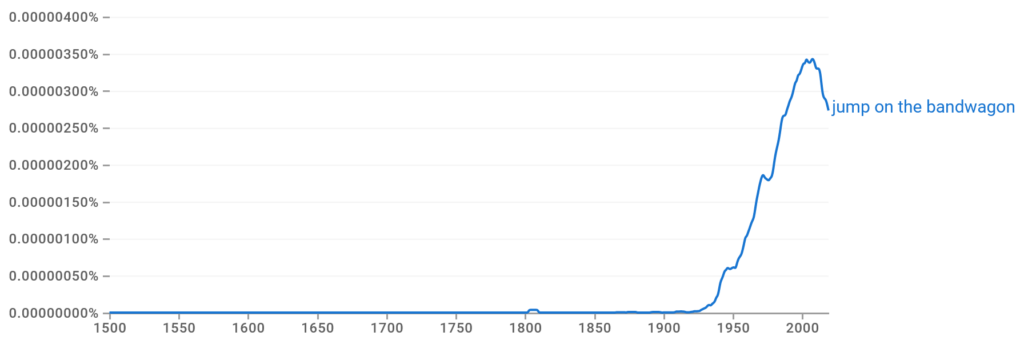Jump on the bandwagon means to join a popular trend or activity, especially when it becomes fashionable or widely accepted.
Idioms such as jump on the bandwagon are phrases or expressions that convey a figurative meaning different from the literal interpretation of the words. They are staples in the English language, highlighting the human tendency to align with prevailing trends or beliefs. But they only make sense when used correctly.
So, in this article, I’ll dissect the meaning, origin, variations, and different uses of this idiom to ensure you grasp it thoroughly. After reading, take the short quiz at the end to test your knowledge of the idiom.

What Does the Idiom Jump on the Bandwagon Mean?
The idiom jump on the bandwagon to adopt a popular activity or trend, especially one gaining widespread acceptance, so you don’t feel left out or behind. It is often used to describe situations where people follow the majority, sometimes without questioning the reasons behind their actions.
The Cambridge Dictionary defines the idiom jump on the bandwagon as “to join an activity that has become very popular or to change your opinion to one that has become very popular so that you can share in its success.”
Basically, it’s a phrase that refers to the act of someone suddenly becoming obsessed with something that’s widely popular because they don’t want to miss out on the attention or feel left out. It often carries a connotation of opportunism, suggesting that the person adopting the trend is more motivated by its popularity than by genuine interest or conviction.
I see it all the time with television, movies, video games, and books. So many of my friends will head out and buy books that go viral on TikTok just so they can say they have it or have read it, even if they don’t like it.
My husband always has to have the latest video game console. He’s always been a Play Station fan. However, when the new Xbox came out, everyone was chattering about how amazing it was, and, of course, he just had to jump on the bandwagon and go buy it.
Sometimes, it’s not about having the coolest or most viral things, though. Sometimes, it’s about FOMO (fear of missing out) that urges people to jump on the bandwagon of certain things.
Literal Meaning vs. Figurative Meaning
The literal meaning of jumping on the bandwagon makes me picture someone jumping onto a wagon that carries a band in a parade—a symbol of public celebration and popularity because all eyes are on it.
But we’re talking about idioms here, which means the metaphorical sense of the expression. Figuratively, the phrase denotes the act of joining a growing movement or trend, typically one that has garnered widespread acceptance or acclaim.
Variations of the Idiom
As certain phrases grow in popularity, they make their way around the world, and sometimes, regional preferences and cultural aspects come into play. Thus, we get variations. Don’t worry; they all still mean the same thing.
- Get on the bandwagon
- Following the bandwagon
- Hop on the bandwagon
- Join the bandwagon movement
How Is Jump on the Bandwagon Commonly Used in Context?
I’ve used this expression in several situations. One was to point out how someone I knew was just following a trend and also to poke fun at myself when I bought into popular things or viral products. But here are a few scenarios where you might use the phrase jump on the bandwagon.
What Are the Different Ways to Use the Idiom Jump on the Bandwagon?
- In marketing: Describing consumer behavior trends. “People seem to love jumping on the bandwagon when products go viral on TikTok, so we should focus our marketing budget there.”
- Social media: Referring to viral challenges or popular hashtags. “I hate how everyone jumps on the bandwagon and starts using popular hashtags they don’t even understand or are related to their content.”
- In politics: When discussing shifting public opinion or political trends. “Since the president announced his plans to disclose info about UFOs, everyone has jumped on the Republican bandwagon.”
What Are Some Tips for Using Jump on the Bandwagon Effectively?
- Understand the context as it works best when used to discuss trends or popular movements.
- Use it to spark discussions about the influence of popular opinion.
- Be cautious of the tone, though, because the phrase can sometimes imply a lack of original thought or blind conformity.
Where Can You Find Examples of the Idiom Jump on the Bandwagon?
It’s a phrase that’s been around for a while and has been worked into film, literature, and media. One of my favorite campy movies from my teenage years, Josey and the Pussycats, hilariously took the idiom and made it the entire theme of the movie. It’s even quoted by one of the characters, “Conform! Free will is overrated! Jump on the bandwagon! There is no such place as Area 51!”
The news and different media outlets just love toting the phrase, too, as you can see from these few examples:
Maybe when people resist change, it’s not because they are stubborn or old-fashioned, but because there is something going on in the workplace that makes it difficult for them to jump on the bandwagon. (The Globe and Mail)
He built a reputation for finding guys in Los Angeles nobody had heard of before and offering them scholarships, only to see Pac-12 schools catch wind, jump on the bandwagon and do their best to steal them away. (The Arizona Daily Star)
What Is the Origin of the Idiom Jump on the Bandwagon?

The idiom jump on the bandwagon originated from a circus marketing ploy of the 1800s. When a circus came to town, the various acts and performers would parade down Main Street to call attention to their impending show.
One of the participants in the circus parade was the bandwagon, a wagon that carried the circus band as it played music.
By the late 1800s, politicians began using bandwagons to drum up interest in their campaigns. Various supporters would ride on the bandwagon with the politician, and the term jump on the bandwagon came to mean someone who supported a certain politician.
How Did the Idiom Evolve Over Time?
The phrase evolved from a literal action in parades to a metaphorical expression used to describe the phenomenon of following popular trends or opinions in various aspects of life. Although it comes from the circus culture of the 1800s, the idiom didn’t really rise in popularity until the 1900s.
What Are Some Related Terms to Jump on the Bandwagon?
Sometimes, an idiom just doesn’t work in the context you’re dealing with. That’s where synonyms and antonyms come in!

Synonyms
- Follow the crowd
- Go with the flow
- Conform to the majority
- Follow the leader
- Keep up with the Joneses
- Trend followers
- Follow the herd
Antonyms
- Go against the grain
- Buck the trend
- Stand alone
Jump on the Bandwagon: Test Your Knowledge!
Choose the correct answer.
What Have We Learned about Jump on the Bandwagon?
In this guide to the jump on the bandwagon idiom, I’ve broken down its meaning, origin, and various contexts of use so that you understand how to use it correctly. Remember, this phrase means to join or support something that has become popular or successful, especially when it was not initially supported or considered.
Whether used in casual conversation or in analyzing cultural trends, jumping on the bandwagon is a vivid metaphor for the widespread phenomenon of following the popular path.
Want to learn about more fun idioms like this one? I’ve got hundreds right here on our site! Go check them out!
Enjoyed reading about this idiom? Check out some others we covered:
